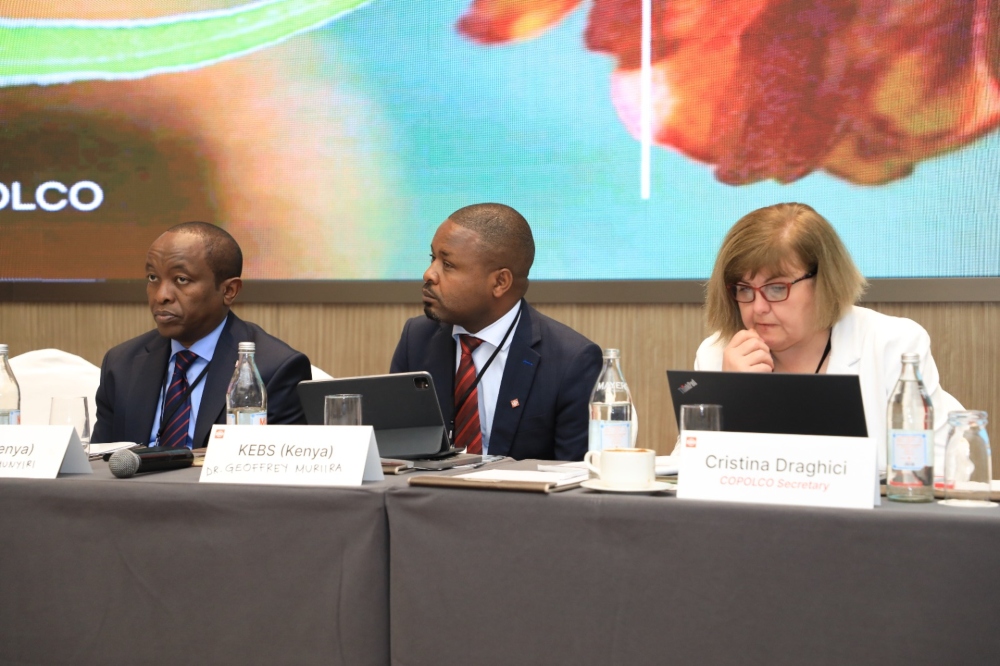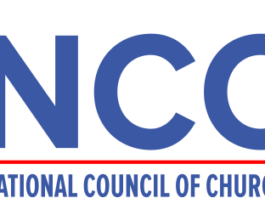The Chairman of the National Standards Council (NSC) Anthony M. Munyiri has affirmed the government’s commitment towards consumer protection and safety through the establishment of the right standardization infrastructure.
Munyiri, who was officially opening the 45th International Organization for Standards (ISO) Committee on Consumer Policy (ISO/COPOLCO) Plenary meeting in Nairobi this morning, stated that standards had assumed grave importance, especially considering the myriad challenges that consumers face today.
The Chairman, whose Council oversees the policy direction of the Kenya Bureau of Standards (KEBS), said standards provide a foundation of safety and reliability and are vital in building consumer confidence while enabling emerging technologies to flourish.
He assured the Plenary that the Kenya government has prioritized standardization not only as a key driver for industrial growth as set out in the Bottom-Up Economic Transformation Agenda but also as an important component in ensuring consumers are protected from harmful products and practices.
Munyiri said Kenya had put in place the right regulatory framework to guarantee consumer protection through the Consumer Protection Act 2012 (No. 46 of 2012) prohibits unfair trade practices and false and misleading advertisements while setting out rights and obligations respecting specific consumer agreements.
The Chairman who was accompanied by the ISO/COPOLCO Acting Chair Eunsook Moon, said it was crucial however that even as the regulatory framework was strengthened, the importance of standards as a solution to consumer protection is prioritized.
“Standards play a very important role in consumer protection by ensuring quality, safety, and reliability of products and services. It is through standards that we’re able to establish benchmarks for product quality and safety, and where recourse can be obtained in the event of harm caused by products that fail to meet applicable standards,” he observed.
Munyiri said the KEBS, as the national standards body, has the mandate to implement and enforce standards pivotal for quality, safety, and efficiency. KEBS is also responsible for issuing quality certification marks like the S-Mark to indicate that a product meets quality standards as a way of helping consumers identify safe and reliable products.
KEBS Managing Director Esther Ngari, in a speech read on her behalf by the organization’s Director for Quality Assurance and Inspection Dr. Geoffrey Muriira, said KEBS plays an important role in providing standardization, metrology, and conformity assessment solutions for sustainable development in the country. The Managing Director said the organization’s mission is to enhance the quality of life, protect consumers, and promote trade, industry, and innovation through rigorous quality control mechanisms. Ngari said even as KEBS establishes and enforces adherence to standards, manufacturers needed to produce goods that meet set benchmarks.
She called for closer cooperation within the ISO community to develop stronger, better, and more consumer-focused relationships, and to enhance communication with consumers to help them make informed and confident decisions.
The ISO/COPOLCO Acting Chair, Eunsook Moon, in her speech called for consumers to be given more say in global trade matters, noting that despite constituting the largest economic group, consumers were rarely consulted on important global matters, especially those relating to standardization.
Moon observed that consumers made up 70 percent of all global spending and hence cannot be ignored whenever important decisions relating to consumption and trade are concerned.
KEBS is hosting the 3-day Plenary is being attended physically by participants from 36 countries who are members of ISO and seeks to explore how standards can support sustainable trade alternatives and the role standards can play in promoting the circular economy. The Plenary, which is themed, Building circularity into sustainable trade, Standards as solutions in consumer protection, will explore examples of good practice and demonstrate how promoting and implementing standards can help national economies set up programs to reduce waste and help consumers make sustainable choices.
It will also consider ways for consumers to be informed about circular processes in the manufacture and reuse of materials and goods through awareness-raising. The plenary will at the same time review the relevance of marks or labels in circularity claims and whether there is an opportunity for new standards work in the area.



